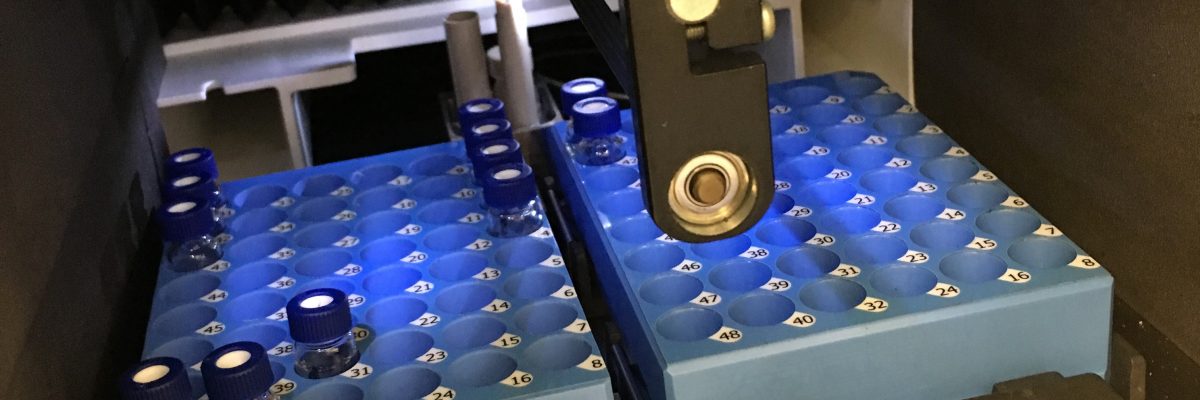UConn’s Proteomics and Metabolomics Facility (PMF) received nearly $1 million from the National Institutes of Health (NIH) to purchase two pieces of state-of-the-art instrumentation that will substantially enhance the Facility’s ability to conduct cutting-edge proteomic analysis, with important implications for understanding human disease.
PMF exists within COR2E (Center for Open Research Resources and Equipment), which provides researchers with access to the expertise and state-of-the-art technology at UConn to promote a collaborative university-wide research support system.
Proteomics is the study of the varieties, quantities, roles, and dynamics of proteins in a mixture, cell, tissue, or organism. PMF uses ultra-high performance liquid chromatography with high-resolution mass spectrometry to identify proteins, peptides, and small molecules in complex mixtures.
Acquiring protein-specific information within a full proteome, the entire set of proteins that can be expressed in a cell, tissue, or organism, is critical for researchers looking to understand how proteins function, particularly in human disease models. Changes to the proteome often directly cause or correlate with disease-specific outcomes in cells, tissues, and organisms.
However, there are several challenges to accessing this valuable information. Proteomes often include tens of thousands of proteins and individual protein members routinely undergo dynamic changes in abundance, localization, and modification, making it difficult to analyze with a single experiment.
Advanced mass spectrometry is a powerful solution to these challenges. This method identifies proteins that exist within a given proteome and produces quantitative measure of protein-specific changes in the same experiment.
By incorporating quantitative mass spectrometry, researchers can leverage protein-specific information to develop new targeted treatments for a host of diseases.
The grant will allow the Facility to purchase a Thermo Scientific Orbitrap Eclipse Tribrid ETD-enabled mass spectrometer and a fully dedicated Dionex Ultimate 3000 RSLCnano ultra-high performance liquid chromatography system.
PMF director Jeremy L. Balsbaugh, who acted as the principal investigator for the grant that will fund the purchase of this instrumentation, will also oversee operation of the equipment.
“Acquisition of the Orbitrap Tribrid Eclipse will fundamentally change proteomics at UConn by providing many new analytical options that currently do not exist anywhere at the university,” Balsbaugh says. “I’m excited to begin incorporating these advanced technologies to elevate proteomics research for important health-related projects at UConn and UConn Health.”
This new equipment will help PMF transform proteomics research at UConn and allow state-of-the-art analysis incorporating maximum ion sensitivity and dramatically increased depth of proteome coverage. The Facility will also be able to provide new gas-phase sequencing options rooted in electron-transfer reactions for peptides and proteins, and apply novel methods to deliver the most accurate quantitation for label-based, multiplexed proteomics that incorporate Tandem Mass Tag technology from Thermo Scientific.
These services are critical for researchers across many fields including cancer research, immunology, pathobiology, materials science, molecular and cell biology, and pharmacology. The Facility provides this important service to UConn researchers, and those beyond the University, affordably, enabling scientific advancement.
Initially, this purchase will directly support 15 investigators from UConn Storrs and UConn Health, including 13 NIH-funded researchers, studying underlying protein contributions to human diseases including epilepsy, cancer, inflammation, microcephaly, neurodegenerative diseases, mitochondrial diseases, and tick-borne diseases. Understanding how proteins contribute to these diseases is a critical step toward developing new patient treatments.
Importantly, additional researchers outside of these 15 investigators will also be able to take advantage of these new features when specific research needs require these advanced methods.
Since opening in 2017, PMF has supported work in more than 100 labs. Prior to receiving this funding, all that work was performed using a single refurbished Thermo Scientific Q Exactive HF mass spectrometer. Due to high demand, the spectrometer was consistently running at full capacity. This older model lacked several key analytical options many of these NIH-funded projects required.
This upgraded technology will allow the Facility to support breakthrough research that requires this high level of analysis.
This grant is an NIH S10 High-End Instrumentation Grant Award No.: 1S10OD028445-01A1



